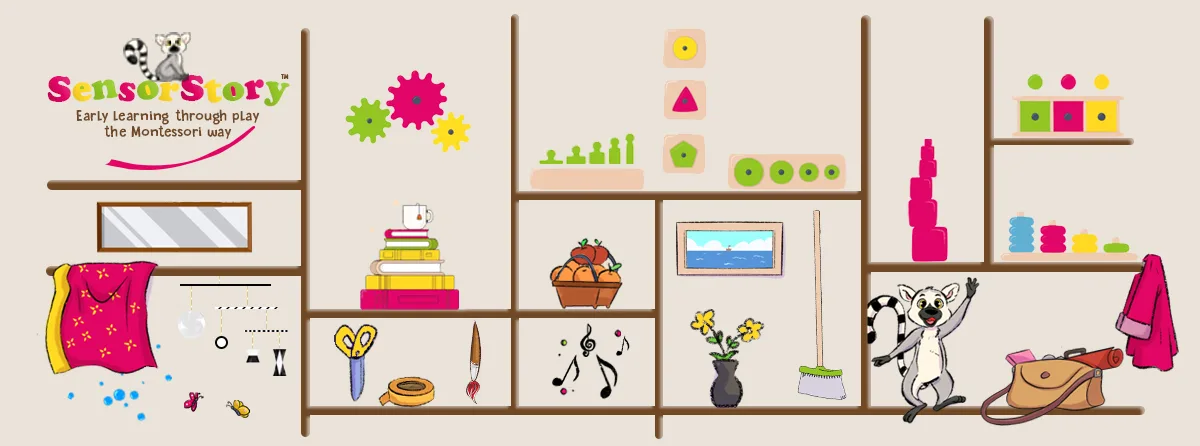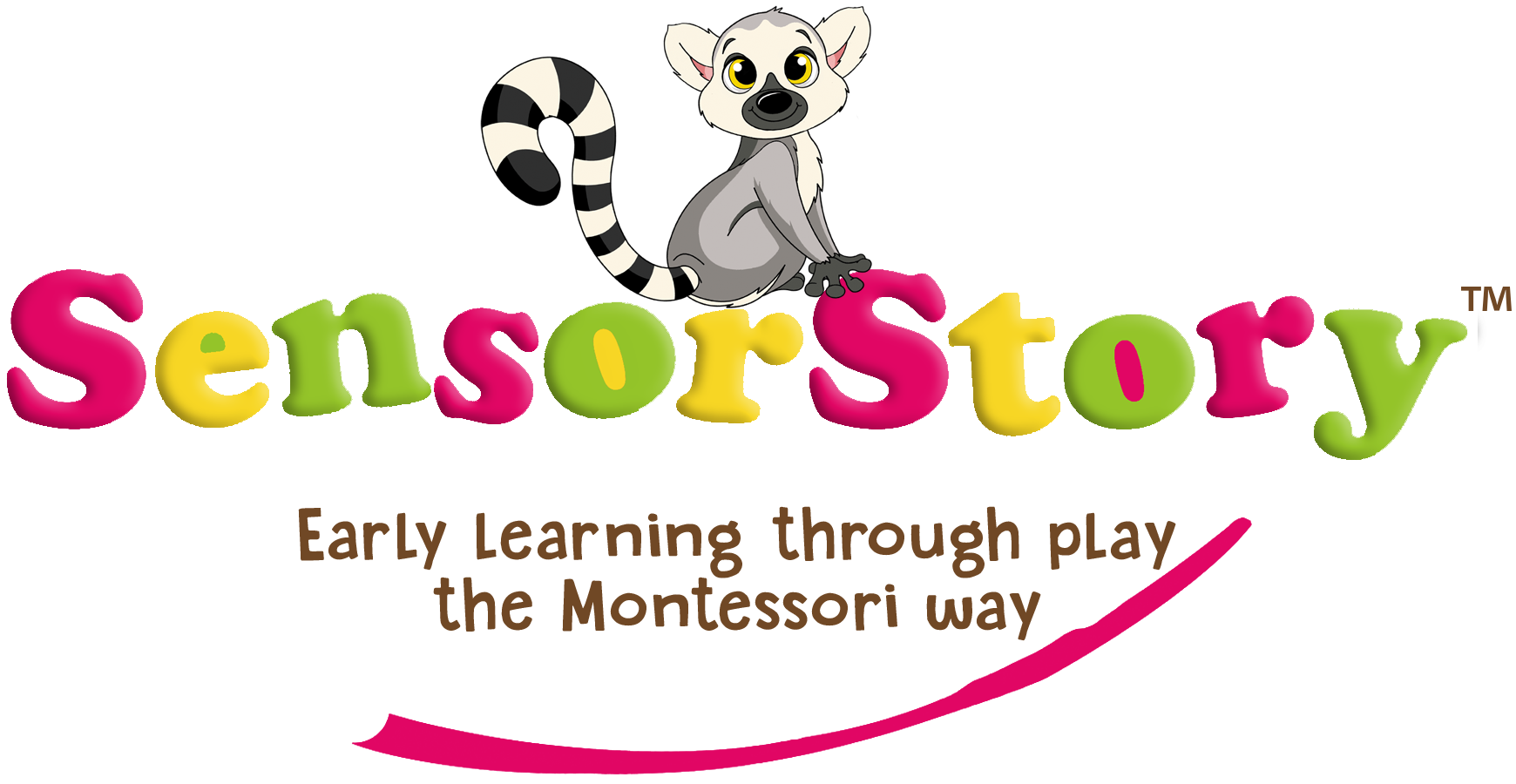We've put together a detailed list of at-home Montessori-aligned activities suitable for a 2.5 year old.
Here you will see age-appropriate activities for all areas, in our Ultimate Series Of Activities to try at home, where the emphasis is on providing a prepared environment and allowing the child to actively engage in self-directed learning.
So what is my child working on mastering at this age?
Between the 2.5 to 3 year age, your toddlers' Sensitive Periods for small objects and order are ending, while being replaced with sensitivity to social interactions and grace and courtesy. To learn more about Sensitive Periods click here. Your toddler is fine-tuning motor skills, mastering advanced language, heightening independence, developing an interest in social situations and purposeful exploration. The Montessori approach aligns with your child's developmental needs, fostering a holistic approach to learning and growth.

1. Practical Life:
* Caring for pets: Encourage your toddler to help replace the water or help with the feeding or brushing of family pets.
* Setting the table: Encourage participation in setting the table.
* Snack and lunch preparation: offer a child-sized age-appropriate knife for cutting soft fruits, vegetables or spreading, and have simple recipes for making sandwiches or snacks.
* Cleaning up after meals: Place a child-sized broom or dustpan in their environment, as well as a small cloth for wiping surfaces, where we can teach the importance of cleaning up after oneself.
* Care of self; putting on coat. Not only a recommended practical life skill to develop, teaching your toddler the Montessori Coat Flip can help with avoiding tantrums when leaving the house by giving your toddler a sence of independence, responsibilty, control and self-confidence. Click for more detailed guidance.
* Snapping and buttoning: Offer fabric pieces with snaps or buttons, dressing frames with different fasteners or simple clothing with large buttons.
* Observation: observe your toddler carefully and respectfully, without interrupting or distracting them, to learn about their needs, interests, and abilities, offering activities that are challenging yet achievable to foster their sense of independence and self-confidence.
* For further guidance on Practical Life Skills and activities by age, click here.
2. Movement:
* Riding tricycles or other age-appropriate bikes.
* Engage in simple yoga or stretching and breath exercises.
* Ball kicking: engage in activities that involve kicking a soft ball back and forth.
* Throwing: you can use soft balls or bean bags and throw and catch between one another, or throw into colour matching containers or hoops.
* Pikler triangle allows your toddler to explore "climbing" in a safe way. A climbing triangle designed to help your toddler develop their gross motor skills, strength, balance and coordination. Allows them to learn their own boundaries and promotes freedom of movement.
* Walking on the line: use masking tape or chalk to create lines on the floor and encourage walking or balancing along the lines.
3. Eye-Hand Coordination:
* Lacing cards and sewing: punch holes in a thin felt shape and offer a shoe lace to lace in and out of the holes to create a pattern. And thread pipe cleaners through paper holes.
* Geometric sorting board.
* Offer increasingly complex puzzles with smaller pieces.
* Pouring and transferring: offer different-sized pitchers and containers with various materials to pour (water, rice, beans). This activity will focus on controlled movements and precision.
* Ball drop activities.
* Cutting practice: provide your toddler with child-safe scissors and show them how to hold and cut along the lines of paper strips or thin cardboard.
* Sorting activities: offer bowls or trays with various items to sort - objects with more complex characteristics for sorting such as shape or texture.
* Offer picture matching cards, engage in object-to-picture matching and colour or shape matching games to promote fine motor skills and visual discrimination.
4. Sensory Exploration:
* Water play: supervise water play with a basin, encouraging your toddler to splash and explore different water temperatures. Add various scoops, watering cans, funnels and watermills for extra interest.
* Sensory bottles: these are simple DIY materials that can help your toddler develop fine motor skills, hand-eye coordination, visual skills, and sensory awareness. You can fill clear plastic bottles with different items, such as water, beads, pom poms, or rice. You can seal the bottles securely and encourage exploration.
* Nature touch and feel: bring nature inside with safe objects like pinecones, leaves, or soft fabric replicas for sensory exploration.
* Create a light box filled with different coloured objects.
* Messy play: offer messy play opportunities with materials like finger paint, pudding, or mud. Explore textures and sensations through hands-on activities, using descriptive words for the sensations experienced. Click to read more on the benefits of Messy Sensory Play, and for a homemade finger paint recipe.
5. Language Development:
* Stereognostic bags: these bags are crafted with narrow openings on the sides, allowing only the hand to enter without enabling visual inspection. The concept behind this design is to encourage your toddler to explore and identify objects solely through touch, fostering the development of their stereognostic sense. This sense becomes prominent around the age of 2.5 years and is commonly employed when, for example, searching for keys in a bag. The containers can be filled with assorted items, preferably those easy to recognise by touch, whether random objects, paired items, or objects following a specific theme.
* Simple vocabulary flashcards use large flashcards with clear images and simple labels introducing basic everyday objects and animals.
* Nursery rhymes and songs: sing simple nursery rhymes and songs together.
6. Culture:
* Offer wooden geography puzzles puzzles featuring continents or countries for geography and world exploration, introducing basic geography concepts like land and water. Use globes or maps for further exploration.
* Art and craft from around the world: engage in simple crafts inspired by different countries (e.g., Japanese origami, Indian rangoli) discussing the cultural significance of each craft. Offers and opportunity to encourage creativity and fine motor skills while fostering respect for cultural diversity.
* Botany: Montessori learning materials for botany include real plants, plant puzzles, plant figurines, and plant cards. You can also use books about plants and nature.
* Cooking activities: explore simple cooking or baking activities inspired by different cuisines. Discuss ingredients, flavors, cooking methods, and encourage your toddler to try the new tastes and textures.
7. Music Exploration:
* Instrumental relaxation: use instrumental music with soothing tones and provide soft instruments like chimes or rainmakers for gentle sounds.
* Echo singing: sing short phrases or make simple sounds for your toddler to echo. Repeat rhythmic patterns and encourage vocal imitation. Celebrate your toddlers attempts at vocal expression.
* Offer percussion instruments like shakers, tambourines, and maracas and encourage your toddler to explore rhythms and beats.
* Instrument making and crafting: create DIY shakers together using small containers and fillings like rice or beans. Craft drums from recycled materials for example, cardboard boxes, and decorate the instruments with stickers or paint.
* Nature sound exploration: explore natural sounds in the environment such as birds, wind, rustling leaves.
8. Art and Self-Expression:
* Drawing and colouring with a variety of materials, encouraging creativity through free art expression.
* Craft activities involving glue, scissors, and different textures.
* Flower pressing exploration.
* Have an easel in your toddlers environment for painting activities.
9. Social Interaction:
* Teach simple conflict resolution strategies by modelling and guide your toddler in resolving conflicts peacefully, providing opportunities for everyone involved to express their feelings.
* Playdates: arrange playdates or group activities to promote social interaction.
* Turn-taking games: engage in simple games that involve taking turns such as passing a soft ball back and forth. Learn more about why Montessori advocates Turn-Taking Over Sharing here.
* Model social behaviour: Demonstrate and encourage turn-taking and cooperation during play.
10. The Whole Child Development:
* Attend our weekly SensorStory Baby and Toddler Montessori parent-child sensory classes! Follow this link to enrol your infant here.
We hope we have given you some inpiration for activities to do with your 2.5 year old!
Remember, follow the child, adapting activities based on your observation of your toddler's developmental stage and individual interests. The key in a Montessori environment is to provide your child with real, purposeful, and age-appropriate tools and materials that allow them to engage in activities independently and at their own pace.
Disclaimer: Adult supervision is required for any activity suggested by SensorStory. Please follow any directions and/or warnings on the labels(s) of any materials used during such activity & be aware of any potential choking hazards or allergies.
Click here to see our full Montessori aligned
Ultimate Series Of Activities for all ages between 0 to 3.
